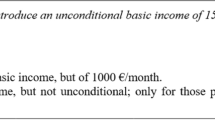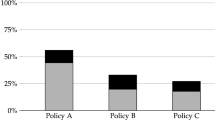Abstract
In this paper we report results of an initial attempt to test the theory of expressive voting. Our experiment involves requiring subjects to vote between receiving $A in cash or having $B donated to charity on their behalf. Across subjects we vary the probability that their vote will decide which disbursement is made. As the probability of being decisive is lowered, the opportunity cost of giving expression to charitable sentiment decreases; hence, the likelihood of voting in accordance with such sentiment is expected to increase. We find weak support for the hypothesis, but the results do not replicate when we alter the parameter settings. Limitations of our design are discussed.
Similar content being viewed by others
References
Brennan, G. (1989). Politics with romance: Towards a theory of democratic socialism. In A. Hamlin and P. Pettit (Eds.), The good polity: Normative analysis of the state, 49–66. New York: Basil Blackwell.
Brennan, G. and Buchanan, J. (1984). Voter choice: Evaluating political alternatives. American Behavioral Scientist 28 (November/December): 185–201.
Brennan, G. and Lomasky, L. (1985). The impartial spectator goes to Washington: Toward a Smithian theory of electoral behavior. Economics and Philosophy 1 (October): 189–211.
Brennan, G. and Lomasky, L. (1987). The logic of electoral preference: Response to Saraydar and Hudelson. Economics and Philosophy 3 (April): 131–138.
Brennan, G. and Pincus, J. (1987). Rational actor theory in politics: A critical review of John Quiggin. Economic Record 63 (March): 22–32.
Grether, D.M. and Plott, C.R. (1979). Economic theory of choice and the preference reversal phenomenon. American Economic Review 69 (September): 623–638.
Hudelson, R. (1987). A note on the empirical adequacy of the expressive theory of voting behavior. Economic and Philosophy 3 (April): 127–130.
Kalt, J.P. and Zupan, M.A. (1984). Capture and ideology in the economic theory of politics. American Economic Review 74 (June): 279–300.
Lee, D.R. (1988). Politics, ideology, and the power of public choice. Virginia Law Review 74 (March): 191–198.
Lomasky, L.E. (1985). Is Social Security politically untouchable? Cato Journal 5 (Spring/Summer): 157–175.
Saraydar, E. (1987). Preferences and voting behavior: Smith's impartial spectator revisited. Economics and Philosophy 3 (April): 121–125.
Tullock, G. (1971). The charity of the uncharitable. Economic Inquiry 9 (December): 379–392.
Author information
Authors and Affiliations
Additional information
This research was supported by the College of the Holy Cross and by a Procter & Gamble grant to the Department of Economics. We gratefully acknowledge the comments and contributions of James Andreoni, Geoffrey Brennan, George Kosicki, Michael Peddle, Tom Rietz, David Schap, James Shepperd, Royce Singleton, Todd Vladyka, Arlington Williams, an anonymous referee, and colleagues in our department research workshop.
Rights and permissions
About this article
Cite this article
Carter, J.R., Guerette, S.D. An experimental study of expressive voting. Public Choice 73, 251–260 (1992). https://doi.org/10.1007/BF00140921
Received:
Accepted:
Issue Date:
DOI: https://doi.org/10.1007/BF00140921




